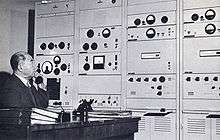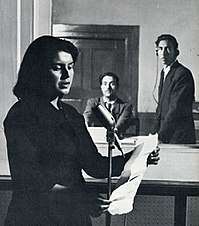Radio Kabul


Radio Kabul is the public radio station of Afghanistan. The name Radio Kabul has been given to many different incarnations of the state-run radio station since the first radio transmitters were installed in Kabul in the 1920s.
In 1925, a 200 watt Russian transmitter operating at AM 833 kHz was installed in Kabul Palace by King Amanullah Khan. This transmitter was destroyed in the 1929 uprising against the king. The transmitter was replaced in 1931 by the new king Mohammed Nadir Shah, and was upgraded in 1940 when a new 20 kilowatt transmitter was installed in its place, operating at 600 kHz. This is generally considered the official birth of Radio Kabul. Programs were broadcast in Pashto, Dari-Persian, Hindi, English, and French.
Throughout the modern history of Afghanistan, the radio has been controlled by (and renamed by) the currently ruling party. As King Mohammed Zahir Shah tried to reinforce his goal of pan-Afghan unity, the station's name was changed in 1953 to the Afghan Broadcasting System, and again in 1960 to Radio Afghanistan. During times of relative peace in the 1960s and 70s, Radio Kabul hosted a whole generation of traditional and modern Afghan artists such as Ustad Mohammad Hussain Sarahang, Ustad Farida Mahwash, and Ustad Mohammad Hashem Cheshti. These master musicians were revered not only in Afghanistan but also in India and other countries.
The various changes of governments during the 1970s were all announced by the new leaders over the radio station. After the Soviet Union installed a puppet government in 1979, Radio Kabul was controlled by the Soviet-backed government and was used to rebroadcast pro-Soviet propaganda directly from the Soviet Union.
During the civil war in the 1990s, the radio station was damaged several times during the fighting, changing hands as different factions gained control of Kabul. In 1996, when the Taliban gained control of Kabul, the station's name was changed to Shariat Ghagh, which means Voice of Sharia. As the Taliban consolidated their power throughout the country, the radio station was used to rally Taliban supporters and to broadcast new edicts by the ruling mullahs. The Taliban banned music on the new station and ordered the destruction of the radio archives, which contained irreplaceable tapes of Radio Kabul music and political programs going back over forty years. The tapes were presumed to have been lost forever, but in 2002 the BBC reported that, miraculously, the archives survived not only the Taliban but the utter destruction of the Radio Kabul building by American bombs during the U.S. invasion of Afghanistan in November 2001. The tapes were hidden by Mohammad Siddiq or "Mr. Computer", the person in charge of the archives, from the Taliban who destroyed what they thought were the archives but were Indian and Iranian music tapes instead. Siddiq claimed there were 50,000 radio tapes.[1]
After the Taliban were driven from power, Radio Kabul resumed its music and political programs. It has been claimed that the first song broadcast by Radio Kabul in 2001 was the famous patriotic song "Watan" (Homeland) by Abdul Wahab Madadi.[2]
References
- ↑ Kabul's radio treasure trove BBC Online
- ↑ War, Exile and the Music of Afghanistan: The Ethnographer’s Tale by John Baily